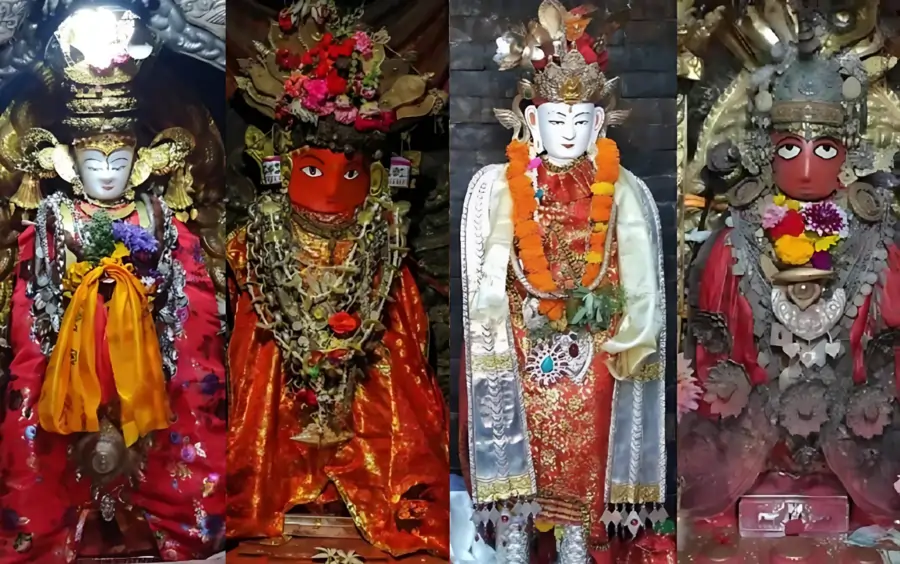Introduction
Karunamaya (करुणामय), also known as Lokesvara (लोकेश्वर) or Avalokiteshvara (अवलोकितेश्वर), is one of the most revered Bodhisattvas in Buddhism. He is the embodiment of infinite compassion and is believed to manifest in various forms to guide sentient beings toward enlightenment. The concept of 108 Lokesvara represents different aspects of Avalokiteshvara’s compassion, wisdom, and protection, each with a unique role in assisting devotees. The number 108 holds deep significance in Buddhist tradition, symbolizing the eradication of worldly afflictions and the path to ultimate liberation.
Each form of Lokesvara is associated with different virtues, such as fearlessness, wisdom, healing, longevity, and prosperity. Many of these manifestations are widely worshiped in Nepal, Tibet, and other Buddhist regions, with their depictions found in ancient scriptures, temples, and artworks. This article explores the 108 sacred forms of Lokesvara, their meanings, and their spiritual significance.
The Four Lokesvara Temples of Kathmandu Valley
The Kathmandu Valley, a sacred land of rich Newar Buddhist culture, is home to four revered Lokesvara temples that embody the compassion and wisdom of Avalokiteshvara. These four Lokesvaras are integral to the religious life of the Newar community, symbolizing protection, fertility, and spiritual enlightenment. Each temple has its own distinct identity, history, and annual festivals, drawing devotees from all over Nepal.
Arya Lokesvara, known locally as Jana Baha Dya or Seto Machhindranath, resides in Jana Bahal, Kathmandu. This white-colored Avalokiteshvara represents purity and infinite compassion, guiding devotees toward enlightenment. The grand Seto Machhindranath Jatra, an annual chariot festival, honors this deity, celebrating his role as a protector and benefactor of the city.
In Patan (Lalitpur), the red-colored Padmapani Lokesvara, also known as Bunga Dya or Rato Machhindranath, is venerated for bringing rain and agricultural prosperity. Worshipped at Karyabinayak, this form of Avalokiteshvara embodies boundless compassion and is celebrated through the Rato Machhindranath Jatra, one of the longest and most significant chariot festivals in Nepal.
Further east, in Nala, Banepa, lies Srstikanti Lokesvara, also called Nala Karunamaya. This white Lokesvara, representing the cosmic force behind creation, is deeply connected to the balance of the universe. Devotees flock to this site seeking blessings for harmony, wisdom, and spiritual renewal.
Finally, Anadadi Lokesvara, also referred to as Chobar Karunamaya or Adinath Lokesvara, is worshipped at Chobar, Kirtipur. Unlike the others, this form of Lokesvara is red, signifying dynamic compassion and transformative power. Believed to be a protector of the valley, Adinath Lokesvara is linked to the legend of Manjushri, who is said to have drained the ancient lake of Kathmandu, making the valley habitable.
These four Lokesvara temples serve as pillars of Buddhist and Newar traditions, reflecting the deep-rooted reverence for Avalokiteshvara in Kathmandu Valley. Through festivals, rituals, and daily worship, these sacred sites continue to inspire and guide generations of devotees on the path of compassion and wisdom.
1. Arya Lokiteshvara
- Sanskrit Name: आर्य अवलोकितेश्वर (Arya Avalokiteshvara)
- Newari Name: जन बहा द्य: (Jana Baha Dya)
- Nepali Name: सेतो मछिन्द्रनाथ (Seto Machhindranath)
- Color: White
- Location: Jana Baha (Janabahal), Kathmandu. See in Map
- Meaning: The Noble Lord who Observes the World
- Symbolism:
- One of the four Lokesvara of Kathmandu Valley
- Supreme Bodhisattva dedicated to the welfare of all sentient beings
- Embodies boundless compassion and wisdom
- Festival: The Seto Machindranath Jatra is an annual chariot festival celebrated in Kathmandu.
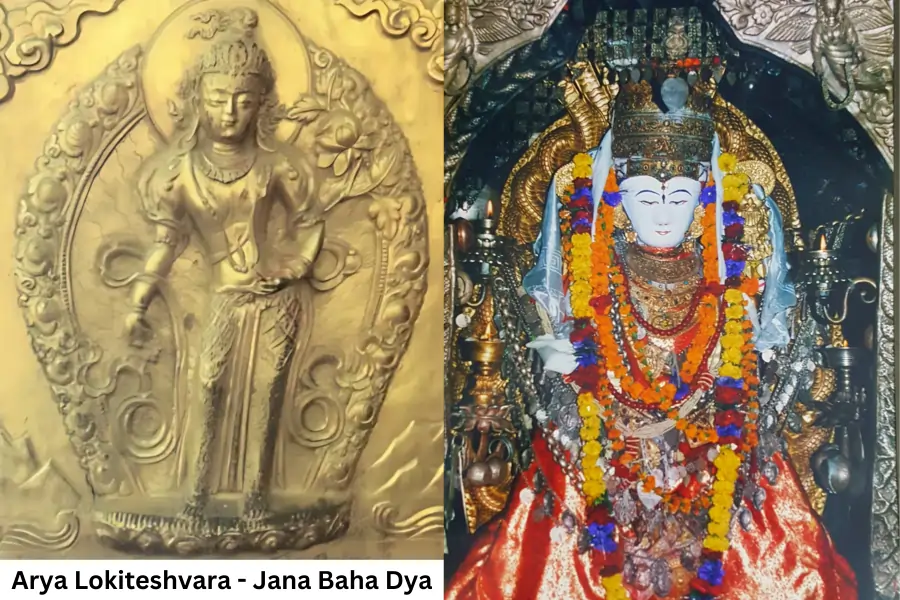
2. Padmapani Lokesvara
- Sanskrit Name: पद्मपाणि लोकेश्वर (Padmapani Lokesvara)
- Newari Name: बुंग द्य: (Bunga Dya)
- Nepali Name: रातो मच्छिन्द्रनाथ (Rato Machhindranath)
- Color: Red
- Location: Karyabinayak, Patan (Lalitpur). See in Map
- Meaning: The Lotus-Handed Lord
- Symbolism:
- One of the four Lokesvara of Kathmandu Valley
- Embodies peace and boundless compassion
- The lotus symbolizes purity rising above worldly attachments
- Festival: The famous Rato Machindranath Jatra is one of the longest and most significant chariot festivals in Nepal, celebrated in Patan.
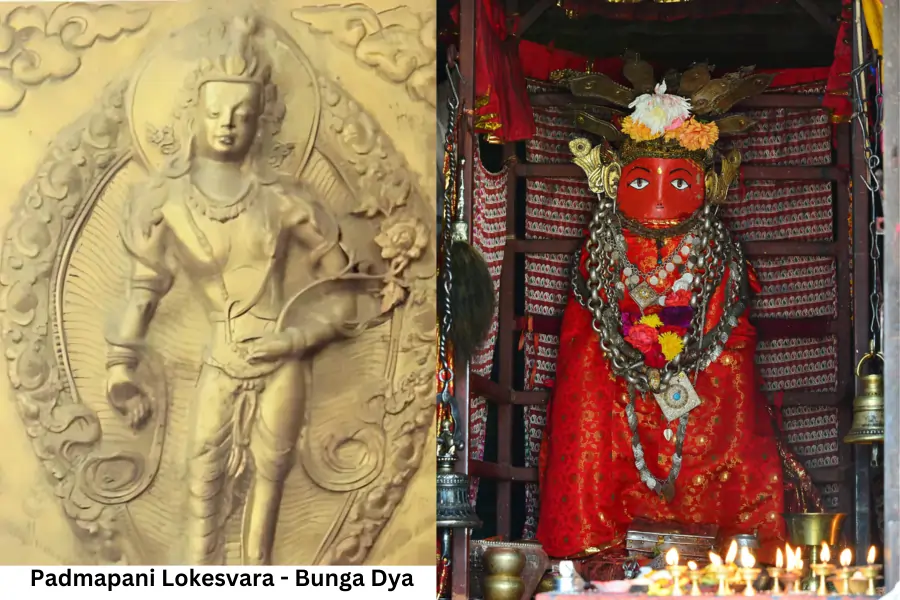
3. Srstikanti Lokesvara
- Sanskrit Name: सृष्टिकान्ति लोकेश्वर (Srstikanti Lokesvara, also spelled as Shristikanta Lokesvara)
- Newari Name: नाला करुणामय द्य: (Nala Karunamaya Dya)
- Color: White
- Location: Banepa, Nala. See in Map
- Meaning: The Creator of the Universe
- Symbolism:
- One of the four Lokesvara of Kathmandu Valley
- Represents the force behind cosmic creation.
- Embodies the divine power of manifestation and existence.
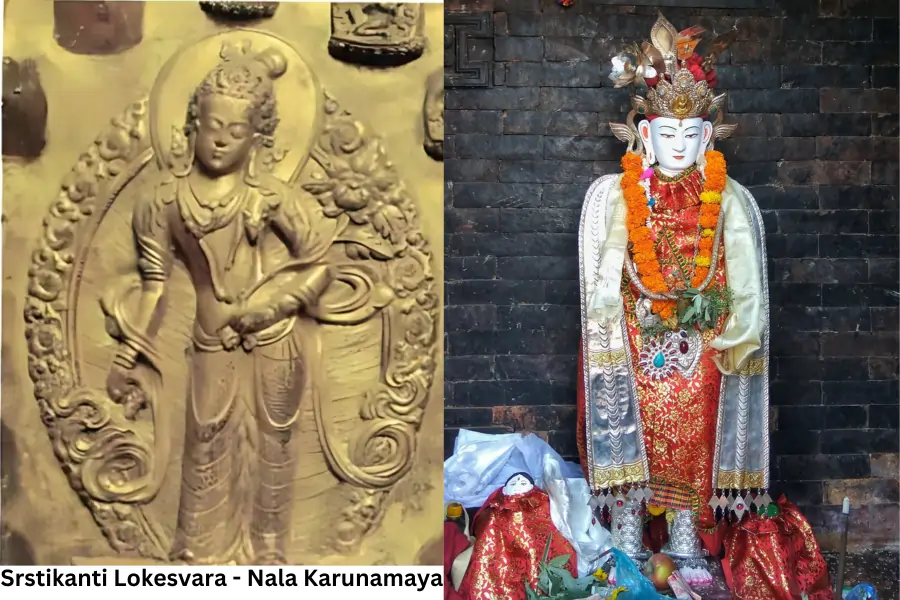
4. Anadadi Lokesvara
- Sanskrit Name: अनादादि लोकेश्वर (Anadadi Lokesvara)
- Newari Name: चोबार करुणामय द्य: (Chobar Karunamaya Dya)
- Nepali Name: आदिनाथ लोकेश्वर (Adhinath Lokesvara)
- Color: Red
- Location: Chobar, Kirtipur. See in Map
- Meaning: The Lord of Compassion
- Symbolism:
- One of the four Lokesvara of Kathmandu Valley
- Embodies limitless compassion and kindness.
- Represents eternal wisdom and guidance.
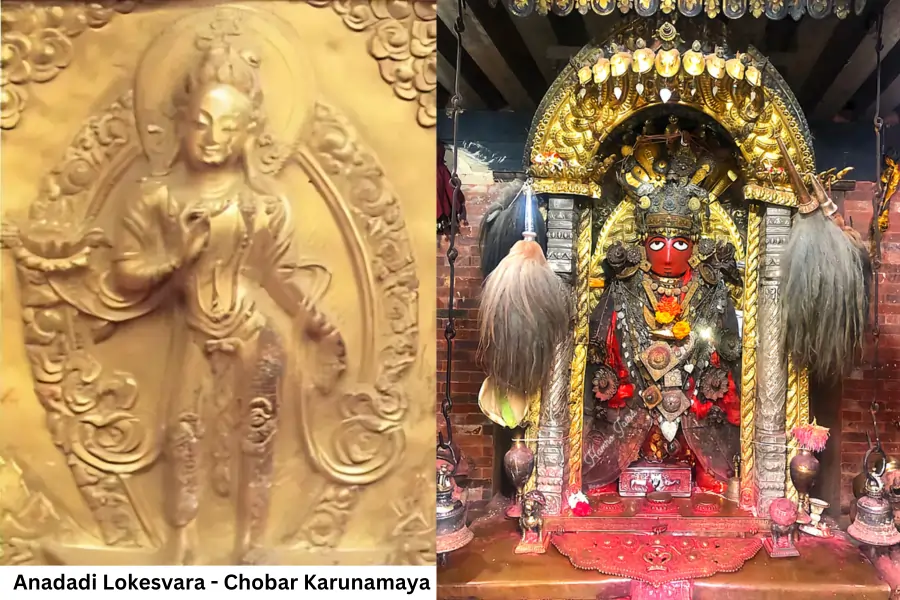
5. Vajranatha Lokesvara
- Sanskrit Name: वज्रनाथ लोकेश्वर (Vajranatha Lokesvara)
- Meaning: Lord of the Thunderbolt
- Symbolism:
- Represents the universal sound OM within the cosmic void
- Signifies unshakable wisdom and spiritual power
6. Nrtyanatha Lokesvara
- Sanskrit Name: नृत्यनाथ लोकेश्वर (Nrtyanatha Lokesvara)
- Meaning: Lord of Spiritual Dance
- Symbolism:
- Depicts divine dance as a means of spiritual awakening
- Represents movement, rhythm, and the harmony of existence
7. Vajrasphota Lokesvara
- Sanskrit Name: वज्रस्फोट लोकेश्वर (Vajrasphota Lokesvara)
- Meaning: The Thunderbolt Exploder
- Symbolism:
- Represents the opening of the mind’s energy centers (Chakras)
- Symbolizes the sudden realization of truth and enlightenment
8. Vidyapati Lokesvara
- Sanskrit Name: विद्यापति लोकेश्वर (Vidyapati Lokesvara)
- Meaning: Lord of Knowledge
- Symbolism:
- Embodies wisdom and scholarly excellence
- Guardian of sacred scriptures and higher learning
9. Vajrapani Lokesvara
- Sanskrit Name: वज्रपाणि लोकेश्वर (Vajrapani Lokesvara)
- Meaning: Thunderbolt-Handed Lord
- Symbolism:
- Represents the power aspect of Lord Buddha’s compassion
- Defender of the Dharma, eliminating obstacles to enlightenment
10. Sankhanatha Lokesvara
- Sanskrit Name: शङ्खनाथ लोकेश्वर (Sankhanatha Lokesvara)
- Meaning: Lord of the Conch Sound
- Symbolism:
- Represents the cosmic sound OM, echoing universal vibration
- Symbolizes divine proclamation and the spreading of wisdom
11. Visnukanta Lokesvara
- Sanskrit Name: विष्णुकान्त लोकेश्वर (Visnukanta Lokesvara)
- Meaning: The Radiance of Vishnu
- Symbolism:
- Renowned as a protector of nature and the balance of life
- Represents harmony between spiritual and natural worlds
12. Manjunatha Lokesvara
- Sanskrit Name: मञ्जुनाथ लोकेश्वर (Manjunatha Lokesvara)
- Meaning: The Lord of Gentle Wisdom
- Symbolism:
- Represents the embodiment of wisdom and knowledge.
- One of the forms of Manjushri, the Bodhisattva of Wisdom.
- Dispels ignorance and brings clarity of thought.
13. Krtanjali Lokesvara
- Sanskrit Name: कृताञ्जलि लोकेश्वर (Krtanjali Lokesvara)
- Meaning: The Lord Who Brings Healing
- Symbolism:
- A form of Avalokiteśvara associated with curing diseases.
- Offers protection from suffering and illness.
- Represents compassionate healing energy.
14. Visnucakra Lokesvara
- Sanskrit Name: विष्णुचक्र लोकेश्वर (Visnucakra Lokesvara)
- Meaning: The Lord of the Protective Wheel
- Symbolism:
- Associated with the wheel of dharma and protection.
- Represents universal order and the safeguarding of righteousness.
- Connects Avalokiteśvara’s compassion with Vishnu’s protective nature.
15. Santamati Lokesvara
- Sanskrit Name: शान्तमति लोकेश्वर (Santamati Lokesvara)
- Meaning: The Lord of Peaceful Mind
- Symbolism:
- A deity representing inner peace and spiritual tranquility.
- Embodies compassion that calms the suffering of sentient beings.
- Helps in meditative practices and achieving inner balance.
16. Cintamani Lokesvara
- Sanskrit Name: चिन्तामणि लोकेश्वर (Cintamani Lokesvara)
- Meaning: The Wish-Fulfilling Jewel Lord
- Symbolism:
- Grants spiritual and material wishes to devotees.
- Symbolizes the Chintamani (wish-fulfilling gem) that fulfills desires.
- Represents generosity, abundance, and divine blessings.
17. Caityadhatu Lokesvara
- Sanskrit Name: चैत्यधातु लोकेश्वर (Caityadhatu Lokesvara)
- Meaning: The Protector of the Stupa
- Symbolism:
- Guardian of stupas and sacred relics.
- Represents the preservation of Buddhist teachings.
- Embodies the sanctity of the body, speech, and mind of the Buddha.
18. Visvavajra Lokesvara
- Sanskrit Name: विश्ववज्र लोकेश्वर (Visvavajra Lokesvara)
- Meaning: The Universal Vajra Lord
- Symbolism:
- Depicts the emptiness (śūnyatā) and ultimate reality of the universe.
- Embodies the unshakable and indestructible nature of wisdom.
- Represents the void and interconnectedness of all things.
19. Vajrasattvadhatu Lokesvara
- Sanskrit Name: वज्रसत्त्वधातु लोकेश्वर (Vajrasattvadhatu Lokesvara)
- Meaning: The Lord of Purification
- Symbolism:
- Associated with Vajrasattva, the deity of purity and atonement.
- Removes negative karma and defilements.
- Represents the purification of body, speech, and mind.
20. Sakyabuddha Lokesvara
- Sanskrit Name: शाक्यबुद्ध लोकेश्वर (Sakyabuddha Lokesvara)
- Meaning: The Lokesvara of Enlightenment
- Symbolism:
- Represents Shakyamuni Buddha’s enlightened wisdom.
- Guides beings toward liberation (nirvana).
- Symbolizes compassionate wisdom and the teaching of dharma.
21. Amitabh Lokesvara
- Sanskrit Name: अमिताभ लोकेश्वर (Amitabh Lokesvara)
- Meaning: The Lord of Infinite Light
- Symbolism:
- A form of Amitabha Buddha, associated with boundless light.
- Represents eternal wisdom and the power to guide beings to enlightenment.
- Symbolizes spiritual illumination and infinite compassion.
22. Vajradhatu Lokesvara
- Sanskrit Name: वज्रधातु लोकेश्वर (Vajradhatu Lokesvara)
- Meaning: The Lord of the Elemental Vajra
- Symbolism:
- Represents the fundamental forces of the universe.
- Embodies the unbreakable and indestructible truth of the dharma.
- Symbolizes the five elements (earth, water, fire, air, and space) in Buddhist cosmology.
23. Dharmacakra Lokesvara
- Sanskrit Name: धर्मचक्र लोकेश्वर (Dharmacakra Lokesvara)
- Meaning: The Lord of the Wheel of Doctrine
- Symbolism:
- Represents the wheel of dharma (law), which guides beings toward enlightenment.
- Symbolizes the Buddha’s teachings and the continuous cycle of wisdom.
24. Simhananda Lokesvara
- Sanskrit Name: सिंहनाद लोकेश्वर (Simhananda Lokesvara)
- Meaning: The Lord of the Lion’s Roar
- Symbolism:
- Known as the protector of the lion-headed dakini.
- Represents fearlessness, confidence, and the powerful proclamation of the truth.
25. Visvabhuta Lokesvara
- Sanskrit Name: विश्वभूत लोकेश्वर (Visvabhuta Lokesvara)
- Meaning: The Lord Who Visualizes Universal Truth
- Symbolism:
- Represents the understanding of universal truth from the past.
- Embodies deep insight into the cosmic nature of existence.
26. Harivahana Lokesvara
- Sanskrit Name: हरिवाहन लोकेश्वर (Harivahana Lokesvara)
- Meaning: The Lord Who Rides the Vehicle of Awareness
- Symbolism:
- Represents the awareness and consciousness that leads to enlightenment.
- Symbolizes divine transport towards ultimate wisdom.
27. Dharmadhatu Lokesvara
- Sanskrit Name: धर्मधातु लोकेश्वर (Dharmadhatu Lokesvara)
- Meaning: The Protector of the Element of Dharma
- Symbolism:
- Represents the pure and indestructible nature of the dharma (law of the universe).
- Protects the wheel of law and the sacred teachings of the Buddha.
28. Harihara Lokesvara
- Sanskrit Name: हरिहर लोकेश्वर (Harihara Lokesvara)
- Meaning: The Lord of the Awareness of Mind
- Symbolism:
- Represents the fusion of awareness and mindfulness.
- Symbolizes the balance between spiritual and worldly knowledge.
29. Kharakhiri Lokesvara
- Sanskrit Name: खरखिरी लोकेश्वर (Kharakhiri Lokesvara)
- Meaning: The Protector of Nature and Longevity
- Symbolism:
- Renowned as the guardian of plants and natural life.
- Represents long life, health, and harmony with nature.
30. Vajradanda Lokesvara
- Sanskrit Name: वज्रदण्ड लोकेश्वर (Vajradanda Lokesvara)
- Meaning: The Lord of the Thunderbolt Staff
- Symbolism:
- Represents the power of punishment and justice.
- Embodies divine authority to remove negativity and ignorance.
31. Acalaketu Lokesvara
- Sanskrit Name: अचलकेतु लोकेश्वर (Acalaketu Lokesvara)
- Meaning: The Protector of the Planet
- Symbolism:
- Associated with the stability and balance of celestial bodies.
- Protects cosmic order and planetary harmony.
32. Khirikhara Lokesvara
- Sanskrit Name: खिलिखर लोकेश्वर (Khirikhara Lokesvara)
- Meaning: The Protector of Nature and Fearlessness
- Symbolism:
- Depicts courage in facing adversities.
- Acts as a guardian of natural ecosystems and sacred spaces.
33. Ratndatta Lokesvara
- Sanskrit Name: रत्नदत्त लोकेश्वर (Ratndatta Lokesvara)
- Meaning: The Protector of Jewels and Knowledge
- Symbolism:
- Guardian of sacred treasures and wisdom.
- Represents spiritual wealth and enlightened knowledge.
34. Bindupani Lokesvara
- Sanskrit Name: बिन्दुपाणि लोकेश्वर (Bindupani Lokesvara)
- Meaning: The Lord of Fearlessness
- Symbolism:
- Embodies courage and protection against fear.
- Represents absolute fearlessness and inner strength.
35. Kamalarudra Lokesvara
- Sanskrit Name: कमलरुद्र लोकेश्वर (Kamalarudra Lokesvara)
- Meaning: The Divine Protector of Wrathful Purity
- Symbolism:
- Balances purity and wrath in guiding beings toward enlightenment.
- Represents compassion in its fierce form, dispelling ignorance.
36. Devadevata Lokesvara
- Sanskrit Name: देवदेवता लोकेश्वर (Devadevata Lokesvara)
- Meaning: The Lord Who Guides Suffering Beings to Liberation
- Symbolism:
- Acts as a supreme guide to enlightenment.
- Represents the path to liberation from suffering.
37. Sarthavaha Lokesvara
- Sanskrit Name: सार्थवाह लोकेश्वर (Sarthavaha Lokesvara)
- Meaning: The Lord Who Embodies the Act of Giving
- Symbolism:
- Represents detachment and selfless generosity.
- Encourages the practice of charity and renunciation.
38. Pindapatra Lokesvara
- Sanskrit Name: पिण्डपत्र लोकेश्वर (Pindapatra Lokesvara)
- Meaning: The Lord Who Directs the Way to Nirvana
- Symbolism:
- Acts as a guide to liberation and freedom from suffering.
- Represents renunciation and spiritual fulfillment.
39. Amoghapasa Lokesvara
- Sanskrit Name: अमोघपाश लोकेश्वर (Amoghapasa Lokesvara)
- Meaning: The Lord of Unfailing Compassion
- Symbolism:
- Embodies compassion that never fails to save sentient beings.
- Leads beings out of suffering and into enlightenment.
40. Mahavajranatha Lokesvara
- Sanskrit Name: महावज्रनाथ लोकेश्वर (Mahavajranatha Lokesvara)
- Meaning: The Lord of Great Spiritual Sound
- Symbolism:
- Represents the divine resonance that awakens spiritual consciousness.
- Symbolizes the powerful sound that destroys illusion.
41. Mahavajrapani Lokesvara
- Sanskrit Name: महावज्रपाणि लोकेश्वर (Mahavajrapani Lokesvara)
- Meaning: The Great Protector and Guide of Buddha
- Symbolism:
- A supreme protector of Dharma and the Buddha’s teachings.
- Embodies unshakable strength and spiritual power.
42. Mahavajradhrk Lokesvara
- Sanskrit Name: महावज्रधृक् लोकेश्वर (Mahavajradhrk Lokesvara)
- Meaning: The Indestructible Lord of Mysteries
- Symbolism:
- Represents the ultimate wisdom and secret teachings.
- Embodies unbreakable knowledge and esoteric truths.
43. Mahavajradhatu Lokesvara
- Sanskrit Name: महावज्रधातु लोकेश्वर (Mahavajradhatu Lokesvara)
- Meaning: The Lord of Power
- Symbolism:
- Represents unshakable strength and divine authority.
- Embodies the fundamental energy that sustains the universe.
44. Mahavisvabhuapa Lokesvara
- Sanskrit Name: महाविश्वभूप लोकेश्वर (Mahavisvabhuapa Lokesvara)
- Meaning: The Lord of the Earth (Protector)
- Symbolism:
- Acts as a guardian of the world and its inhabitants.
- Represents stability, protection, and nurturing care.
45. Manjubhuta Lokesvara
- Sanskrit Name: मञ्जुभूत लोकेश्वर (Manjubhuta Lokesvara)
- Meaning: The Deity of Wisdom
- Symbolism:
- A form of Manjushri, associated with supreme wisdom.
- Dispels ignorance and leads beings toward enlightenment.
46. Mahaabhayasthula Lokesvara
- Sanskrit Name: महाभयस्थूल लोकेश्वर (Mahaabhayasthula Lokesvara)
- Meaning: The Protector of Timelessness
- Symbolism:
- Represents transcendence beyond time and space.
- Embodies eternal wisdom and liberation from worldly fears.
47. Mahanbhayankari Lokesvara
- Sanskrit Name: महानभयनकरी लोकेश्वर (Mahanbhayankari Lokesvara)
- Meaning: The Deity of Welfare and Fearlessness
- Symbolism:
- Protects all beings from suffering and fear.
- Embodies compassionate action for the welfare of sentient beings.
48. Mahasuryabimba Lokesvara
- Sanskrit Name: महासूर्यबिम्ब लोकेश्वर (Mahasuryabimba Lokesvara)
- Meaning: The Protector of Sun Rays (Brightness)
- Symbolism:
- Represents the power of the sun in dispelling darkness.
- Embodies spiritual illumination and wisdom.
49. Mahancandrabimba Lokesvara
- Sanskrit Name: महानचन्द्रबिम्ब लोकेश्वर (Mahancandrabimba Lokesvara)
- Meaning: The Protector of the Moon (Light)
- Symbolism:
- Represents the calming, cooling energy of the moon.
- Symbolizes serenity, reflection, and spiritual tranquility.
50. Mahamanjudatta Lokesvara
- Sanskrit Name: महामञ्जुदत्त लोकेश्वर (Mahamanjudatta Lokesvara)
- Meaning: The Deity of Supreme Wisdom
- Symbolism:
- Another form of Manjushri, embodying perfect wisdom.
- Represents the gift of knowledge and insight.
51. Mahasila Lokesvara
- Sanskrit Name: महासील लोकेश्वर (Mahasila Lokesvara)
- Meaning: The Deity of Discipline
- Symbolism:
- Represents moral discipline and righteous living.
- Guides practitioners toward self-control and ethical conduct.
52. Maharatnakula Lokesvara
- Sanskrit Name: महारत्नकुल लोकेश्वर (Maharatnakula Lokesvara)
- Meaning: The Protector of Wealth
- Symbolism:
- Embodies prosperity and material well-being.
- Represents spiritual wealth and generosity.
53. Mahasahasrasurya Lokesvara
- Sanskrit Name: महासहस्रसूर्य लोकेश्वर (Mahasahasrasurya Lokesvara)
- Meaning: The Lord and Protector of the Sun (Light)
- Symbolism:
- Represents the immense power of the sun in illuminating the world.
- Embodies spiritual radiance, truth, and wisdom.
54. Sahasrbhuja Lokesvara
- Sanskrit Name: सहस्रभुज लोकेश्वर (Sahasrbhuja Lokesvara)
- Meaning: The Lord of Compassion
- Symbolism:
- Renowned as a supreme embodiment of compassion.
- Represents boundless mercy and assistance to all sentient beings.
55. Maharatnakirti Lokesvara
- Sanskrit Name: महारत्नकीर्ति लोकेश्वर (Maharatnakirti Lokesvara)
- Meaning: The Protector of Prosperity and Fame
- Symbolism:
- Embodies the safeguarding of material and spiritual prosperity.
- Represents fame, success, and the well-being of all beings.
56. Sahasrabhuja Lokesvara
- Sanskrit Name: सहस्रभुज लोकेश्वर (Sahasrabhuja Lokesvara)
- Meaning: The Thousand-Armed Lord of Compassion
- Symbolism:
- Depicted with 1000 arms and 1000 eyes, signifying infinite compassion.
- Has eleven heads, representing his ability to hear the cries of all suffering beings.
57. Akasyamati Lokesvara
- Sanskrit Name: आकाश्यमति लोकेश्वर (Akasyamati Lokesvara)
- Meaning: The Lord of Wish-Fulfillment
- Symbolism:
- Grants the fulfillment of noble wishes and aspirations.
- Embodies the boundless mind like the vast sky.
58. Samantabhadra Lokesvara
- Sanskrit Name: समन्तभद्र लोकेश्वर (Samantabhadra Lokesvara)
- Meaning: The Lord Who Relieves Suffering
- Symbolism:
- Embodies universal compassion and benevolence.
- Helps beings overcome suffering and achieve enlightenment.
59. Ksitigarbha Lokesvara
- Sanskrit Name: क्षितिगर्भ लोकेश्वर (Ksitigarbha Lokesvara)
- Meaning: The Lord of Great Compassion and Vows
- Symbolism:
- Known for his great compassion toward beings suffering in hell.
- Represents the vow to liberate all sentient beings from suffering.
60. Akasagarbha Lokesvara
- Sanskrit Name: आकाशगर्भ लोकेश्वर (Akasagarbha Lokesvara)
- Meaning: The Lord Whose Essence is Space
- Symbolism:
- One of the eight great Bodhisattvas.
- Represents the infinite and all-encompassing nature of wisdom.
61. Gaganaganja Lokesvara
- Sanskrit Name: गगनगञ्ज लोकेश्वर (Gaganaganja Lokesvara)
- Meaning: The Lord of Infinite and Pure Generosity
- Symbolism:
- His generosity is as vast and pure as the sky.
- Embodies limitless kindness, charity, and selfless giving.
62. Ratnapani Lokesvara
- Sanskrit Name: रत्नपाणि लोकेश्वर (Ratnapani Lokesvara)
- Meaning: The Lord and Protector of Jewels and Water
- Symbolism:
- Guardian of precious treasures and the purity of water.
- Represents abundance, wealth, and the sustaining power of water.
63. Sagarmati Lokesvara
- Sanskrit Name: सागरमति लोकेश्वर (Sagarmati Lokesvara)
- Meaning: The Lord of the Ocean
- Symbolism:
- Represents the vastness and depth of wisdom.
- Embodies compassion as deep and limitless as the sea.
64. Vajragarbha Lokesvara
- Sanskrit Name: वज्रगर्भ लोकेश्वर (Vajragarbha Lokesvara)
- Meaning: The Deity of Internal Power
- Symbolism:
- Embodies inner strength and resilience.
- Represents unbreakable wisdom and spiritual determination.
65. Avalokiteshvara Lokesvara
- Sanskrit Name: अवलोकितेश्वर लोकेश्वर (Avalokiteshvara Lokesvara)
- Meaning: The Bodhisattva of Compassion
- Symbolism:
- The supreme embodiment of universal compassion.
- Represents the vow to aid all suffering beings.
66. Mahasthamaprapta Lokesvara
- Sanskrit Name: महास्थामप्राप्त लोकेश्वर (Mahasthamaprapta Lokesvara)
- Meaning: The Lord of Receiving Spiritual Power
- Symbolism:
- Represents the attainment of great spiritual strength.
- Embodies the ability to overcome obstacles through wisdom.
67. Candraprabha Lokesvara
- Sanskrit Name: चन्द्रप्रभ लोकेश्वर (Candraprabha Lokesvara)
- Meaning: The Lord of the Protection of Moonlight
- Symbolism:
- Represents the calming, nurturing energy of the moon.
- Embodies tranquility, purity, and spiritual illumination.
68. Jaliniprabha Lokesvara
- Sanskrit Name: जालिनिप्रभ लोकेश्वर (Jaliniprabha Lokesvara)
- Meaning: The Deity Representing the Importance of Water
- Symbolism:
- Symbolizes the essential nature of water in sustaining life.
- Represents fluidity, adaptability, and purification.
69. Amitaprabha Lokesvara
- Sanskrit Name: अमितप्रभ लोकेश्वर (Amitaprabha Lokesvara)
- Meaning: The Bodhisattva of Longevity
- Symbolism:
- Grants long life, vitality, and good health.
- Embodies infinite light and the continuity of spiritual wisdom.
70. Pratibhanakuta Lokesvara
- Sanskrit Name: प्रतिभानकूट लोकेश्वर (Pratibhanakuta Lokesvara)
- Meaning: The Deity of Wisdom and Purity
- Symbolism:
- Represents intellectual brilliance and clarity.
- Embodies the power of wisdom to remove ignorance.
71. Sarvasokatamonirghatamati Lokesvara
- Sanskrit Name: सर्वशोकतामोनिर्घातमति लोकेश्वर (Sarvasokatamonirghatamati Lokesvara)
- Meaning: The Deity Who Destroys All Sorrows and Inertia
- Symbolism:
- Destroys all suffering, grief, and negative energy.
- Represents mental and emotional liberation from obstacles.
72. Sarvanivarnaviskambhi Lokesvara
- Sanskrit Name: सर्वनिवारणविष्कम्भी लोकेश्वर (Sarvanivarnaviskambhi Lokesvara)
- Meaning: The Lord Who Purifies All Sins
- Symbolism:
- Removes all obstructions and sins of devotees.
- Represents purification and spiritual renewal.
73. Karandavyuha Lokesvara
- Sanskrit Name: करण्डव्यूह लोकेश्वर (Karandavyuha Lokesvara)
- Meaning: The Bodhisattva Who Liberates Hungry Ghosts
- Symbolism:
- Frees pretas (hungry ghosts) from suffering.
- Represents compassion and the alleviation of extreme hunger and thirst.
74. Jnanadhatu Lokesvara
- Sanskrit Name: ज्ञानधातु लोकेश्वर (Jnanadhatu Lokesvara)
- Meaning: The Deity of Knowledge of Elements
- Symbolism:
- Represents profound knowledge of the elements.
- Embodies the wisdom needed for self-realization.
75. Padmanrtya Lokesvara
- Sanskrit Name: पद्मनृत्य लोकेश्वर (Padmanrtya Lokesvara)
- Meaning: The God of Dance
- Symbolism:
- Known as the deity in a dancing attitude.
- Represents cosmic rhythm, movement, and harmony.
76. Vajrasnisa Lokesvara
- Sanskrit Name: वज्रस्निष लोकेश्वर (Vajrasnisa Lokesvara)
- Meaning: The Deity of Fearlessness and Giving
- Symbolism:
- Grants fearlessness and detachment.
- Represents selfless giving and unwavering courage.
77. Sakydhatu Lokesvara
- Sanskrit Name: शाक्यधातु लोकेश्वर (Sakydhatu Lokesvara)
- Meaning: The Bodhisattva Who Attains Enlightenment
- Symbolism:
- Guides beings toward attaining Buddhahood.
- Embodies the wisdom and determination to achieve enlightenment.
78. Santasri Lokesvara
- Sanskrit Name: शान्तश्री लोकेश्वर (Santasri Lokesvara)
- Meaning: The Bodhisattva Who Depicts Peace in Emptiness
- Symbolism:
- Represents inner peace and the realization of emptiness (śūnyatā).
- Helps beings overcome attachment and suffering.
79. Yamandanda Lokesvara
- Sanskrit Name: यमदण्ड लोकेश्वर (Yamandanda Lokesvara)
- Meaning: The Penalizer of Yama, the God of Death
- Symbolism:
- Acts as a force that balances karma and justice.
- Represents righteous judgment and consequences of actions.
80. Visvahara Lokesvara
- Sanskrit Name: विश्वहर लोकेश्वर (Visvahara Lokesvara)
- Meaning: The Lord of Universal Truth
- Symbolism:
- Represents the ultimate truth that transcends all illusions.
- Embodies universal wisdom and enlightenment.
81. Mahavajrasattva Lokesvara
- Sanskrit Name: महावज्रसत्त्व लोकेश्वर (Mahavajrasattva Lokesvara)
- Meaning: The Lord of Purification of Body and Mind
- Symbolism:
- Removes impurities from the body and mind.
- Represents spiritual cleansing and renewal.
82. Krsnacala Lokesvara
- Sanskrit Name: कृष्णचाल लोकेश्वर (Krsnacala Lokesvara)
- Meaning: The Protector of Knowledge Leading to Enlightenment
- Symbolism:
- Represents the wisdom that leads to enlightenment.
- Protects sacred knowledge and its transmission.
83. Sukhavati Lokesvara
- Sanskrit Name: सुखावती लोकेश्वर (Sukhavati Lokesvara)
- Meaning: The Bodhisattva of Purity in the Pure Land of Amitabha
- Symbolism:
- Belongs to Amitabha Buddha’s Pure Land (Sukhavati).
- Represents purity, serenity, and spiritual bliss.
84. Acintya Lokesvara
- Sanskrit Name: अचिन्त्य लोकेश्वर (Acintya Lokesvara)
- Meaning: The Deity for Attaining Enlightenment and Benefiting Sentient Beings
- Symbolism:
- Represents profound wisdom beyond ordinary comprehension.
- Embodies compassionate action for the welfare of all beings.
85. Unnati Lokesvara
- Sanskrit Name: उन्नति लोकेश्वर (Unnati Lokesvara)
- Meaning: The Deity of Prosperity
- Symbolism:
- Grants spiritual and material prosperity.
- Represents growth, success, and well-being.
86. Pravara Lokesvara
- Sanskrit Name: प्रवर लोकेश्वर (Pravara Lokesvara)
- Meaning: The Bodhisattva for Protection of Health
- Symbolism:
- Protects beings from disease and ailments.
- Represents healing and longevity.
87. Vajradharma Lokesvara
- Sanskrit Name: वज्रधर्म लोकेश्वर (Vajradharma Lokesvara)
- Meaning: The Deity Representing the Power of Dharma
- Symbolism:
- Embodies the strength and authority of Buddhist teachings.
- Represents unshakable faith and righteousness.
88. Vasyadhikara Lokesvara
- Sanskrit Name: वश्यधिकर लोकेश्वर (Vasyadhikara Lokesvara)
- Meaning: The Deity for Control of the Mind
- Symbolism:
- Helps practitioners achieve mastery over their thoughts.
- Represents mental discipline, concentration, and clarity.
89. Khasarpana Lokesvara
- Sanskrit Name: खसर्पण लोकेश्वर (Khasarpana Lokesvara)
- Meaning: The Protector of All Flying Sentient Beings
- Symbolism:
- Protects birds and other aerial beings.
- Represents freedom, movement, and transcendence.
90. Simhanatha Lokesvara
- Sanskrit Name: सिंहनाथ लोकेश्वर (Simhanatha Lokesvara)
- Meaning: The Deity Who Reflects the Power of Sound (Lion’s Roar)
- Symbolism:
- Embodies the fearless proclamation of truth.
- Represents strength, courage, and the power of voice.
91. Trailokyasandarsana Lokesvara
- Sanskrit Name: त्रैलोक्यसंदर्शन लोकेश्वर (Trailokyasandarsana Lokesvara)
- Meaning: The Lord Who Represents Heaven, Earth, and Hell
- Symbolism:
- Represents the three realms of existence.
- Embodies awareness of all levels of reality.
92. Raktaryava Lokesvara
- Sanskrit Name: रक्तार्यव लोकेश्वर (Raktaryava Lokesvara)
- Meaning: The Deity of Rainfall
- Symbolism:
- Represents the power to bring rain and sustain life.
- Embodies fertility, renewal, and balance in nature.
93. Nilkantha Lokesvara
- Sanskrit Name: नीलकण्ठ लोकेश्वर (Nilkantha Lokesvara)
- Meaning: The Protector of Poison
- Symbolism:
- One of the forms of Lord Shiva, embodying purification and protection.
- Represents the ability to neutralize toxins, both physical and spiritual.
94. Sugati-Sandarsana Lokesvara
- Sanskrit Name: सुगति-संदर्शन लोकेश्वर (Sugati-Sandarsana Lokesvara)
- Meaning: The Deity for Protection and Fearlessness in Meditation
- Symbolism:
- Grants courage in deep meditation and spiritual practices.
- Protects against distractions and negative forces.
95. Mayajalakram Krodha Lokesvara
- Sanskrit Name: मयाजालक्रम क्रोध लोकेश्वर (Mayajalakram Krodha Lokesvara)
- Meaning: The Bodhisattva Who Defeats Hatred and Desire
- Symbolism:
- Helps overcome anger, attachment, and ignorance.
- Represents the destruction of negative emotions.
96. Preta-Samtarpita Lokesvara
- Sanskrit Name: प्रेत-संतर्पित लोकेश्वर (Preta-Samtarpita Lokesvara)
- Meaning: The Deity of Oneness with Buddha
- Symbolism:
- Represents surrender and complete devotion to the Buddha.
- Brings liberation to suffering beings, including hungry ghosts (pretas).
97. Brahmadanda Lokesvara
- Sanskrit Name: ब्रह्मदण्ड लोकेश्वर (Brahmadanda Lokesvara)
- Meaning: The Protector of Universal Law
- Symbolism:
- Ensures the maintenance of cosmic justice.
- Represents moral discipline and righteousness.
98 Jatamukta Lokesvara
- Sanskrit Name: जटामुक्त लोकेश्वर (Jatamukta Lokesvara)
- Meaning: The Deity of Longevity, Protection, and Purity
- Symbolism:
- Grants long life and protection from harm.
- Represents spiritual and physical purity.
99. Varada Lokesvara
- Sanskrit Name: वरद लोकेश्वर (Varada Lokesvara)
- Meaning: The Deity of Protection
- Symbolism:
- Grants protection from all forms of suffering.
- Represents divine blessings and fulfillment of wishes.
100. Kamandalu Lokesvara
- Sanskrit Name: कमण्डलु लोकेश्वर (Kamandalu Lokesvara)
- Meaning: The Bodhisattva of Longevity
- Symbolism:
- Symbolizes sustenance and nourishment for spiritual seekers.
- Represents purification and renewal.
101. Manipadma Lokesvara
- Sanskrit Name: मणिपद्म लोकेश्वर (Manipadma Lokesvara)
- Meaning: The Deity of Purity of Body and Mind
- Symbolism:
- Embodies flawless purity, like a lotus rising above mud.
- Represents moral and spiritual perfection.
102. Pitapatta Lokesvara
- Sanskrit Name: पीतपत्र लोकेश्वर (Pitapatta Lokesvara)
- Meaning: The Protector of Ancestors and Energy
- Symbolism:
- Protects the spirits of ancestors and maintains lineage traditions.
- Represents spiritual energy and karmic balance.
103. Sadaksari Lokesvara
- Sanskrit Name: षडाक्षरी लोकेश्वर (Sadaksari Lokesvara)
- Meaning: The Deity of Great Compassion
- Symbolism:
- Always ready to help all sentient beings.
- Represents the six-syllable mantra “Om Mani Padme Hum”.
104. Mayajalakrama Lokesvara
- Sanskrit Name: मयाजालक्रम लोकेश्वर (Mayajalakrama Lokesvara)
- Meaning: The Bodhisattva Who Reflects Hatred, Attachment, and Ignorance
- Symbolism:
- Embodies awareness of illusions and mental afflictions.
- Helps beings overcome worldly attachments.
105. Harihariharivahana Lokesvara
- Sanskrit Name: हरिहरिहरिवाहन लोकेश्वर (Harihariharivahana Lokesvara)
- Meaning: The Great Protector of All Sentient Beings
- Symbolism:
- Acts as the guardian of all life forms.
- Also known as the god of divine vehicles (vahana).
106. Halahala Lokesvara
- Sanskrit Name: हलाहल लोकेश्वर (Halahala Lokesvara)
- Meaning: The Protector of Royals
- Symbolism:
- Represents the protection of kings, rulers, and leadership.
- Ensures wisdom in governance and protection of dharma.
107. Halahalika Lokesvara
- Sanskrit Name: हलाहलिक लोकेश्वर (Halahalika Lokesvara)
- Meaning: The Deity of Protection
- Symbolism:
- Provides divine shielding from physical and spiritual harm.
- Represents unwavering safety and security.
108. Hayagriva Lokesvara
- Sanskrit Name: हयग्रीव लोकेश्वर (Hayagriva Lokesvara)
- Meaning: The Protector of the Six Realms
- Symbolism:
- Represents the protection of beings within the Wheel of Life.
- Ensures spiritual guidance across all realms of existence.
Conclusion
The 108 forms of Lokesvara serve as a profound reminder of Avalokiteshvara’s boundless compassion and commitment to aiding all sentient beings. Each form embodies a unique quality, addressing different aspects of suffering and spiritual growth. Worshiping or meditating upon these forms helps practitioners cultivate wisdom, compassion, and a deeper connection to the Buddhist path.
In Buddhist traditions, Lokesvara is not just a deity but an ideal, an aspiration for selfless service and enlightenment. Whether through prayers, rituals, or philosophical study, the presence of Avalokiteshvara remains a guiding force for those seeking liberation from the cycle of suffering. The 108 manifestations illustrate the infinite ways in which the Bodhisattva responds to the needs of the world, reinforcing the universal message of love, patience, and harmony.
By understanding and honoring these sacred forms, practitioners can draw inspiration from Avalokiteshvara’s teachings and embody his virtues in their own lives, making the world a more compassionate and enlightened place.

